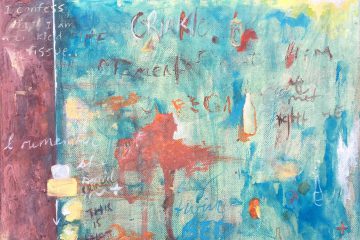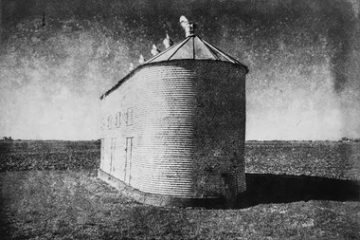Paraguay was an expanse of flatness except for one region, the Cordillera, where modest green lumps punctured the Paraná basin. My friend Aparicio was born in the Cordillera and grew cotton on small slopes where torrents hewed gullies from clay soil. But the torrents had not come this year. In Guarani, the indigenous language of Paraguay, everyone said “Ndaipori oky” — “No rain.”
One day after tea, I went with him to the fields. Even in early light, the white petals half blinded me, and through a cotton shirt green bristles raked my skin. I worked slowly, picking thin, thirsty cotton fibers from their bolls, stuffing the fiber into a brown burlap sack, moving unhurriedly down row after row, ascending the slope. Aparicio moved quickly in front of me. His nut brown hands snapped up the cotton. Soon he was farther in front, then only faintly distinct, his straw hat waving amid the dazing flowers.
At ten, our work ended, as the sun was high. Our sacks and their cargo were stored in a crude shed. After this, Aparicio brought out wooden chairs and placed them in the shade of the house. Then he brought cold yerba tea.
“Good work,” he said in Guarani, saying nothing of my near-empty sack. “Soon you will pick like a Paraguayan, like a campesino.”
“Never like you,” I replied.
In the muggy air, the shade only partly hid us from the heat. We had worked for five hours and picked twenty kilograms – enough for Aparicio to buy half a beer.
Six months later, it was time to plant. The rains had not yet come to the Cordillera. The grass was brown and the tuffs held poorly to fine sand that, with the slightest gusts of wind, flowed downslope and into the torrent-hewed gullies. The cotton rows were brown. But this was not – I was to find – altogether unwelcome.
It was after England defeated Ecuador in the World Cup, and late afternoon. We sat in the shade of Aparicio’s house, drinking the yerba ice tea and occasionally attempting conversation in Spanish and Guarani. Aparicio looked up the mountain.
“Would you like to find eggs?” he asked.
“Eggs? Where?”
“I’ll show you.”
The Cordillera lies in the subtropics, south of the Amazon rain forest. Before the Spanish, the granitic hills were clothed in deciduous trees, tall grasses, and small burns. Now, acres of woodlands were razed for crops, making quilt work of the virgin forest. One tree remained in the barren squares, and it was not even a tree. Coconut palms, prized for fruit, survived amid the clear-cuts.
We arrived at one of Aparicio’s fields. This was a new field, freshly cleared. He had not planted cotton there before. It clung to a steep hillside as if stapled by the remaining coconut palms. Everywhere lay remnants of the coconut’s neighbors, felled by Aparicio’s axe. There was common yvyra pyta, stately yvyraro, and lesser known urunde and tatare. Their leaves were cracked and the bleached trunks sweated in the sun.
“Where are the eggs?” I asked.
“Underneath.”
He led me to the bottom of a ravine, by a parched stream that flowed to the great Rio Parguay. Coolness floated along its banks. It was then I noticed a western breeze at my back, coming from heights behind me. The slopes above us had chilled and heavy air was falling into the valley. We were in a rain shadow.
Producing matches from his breast pocket, Aparicio lighted a desiccated palm frond. “Let’s make some eggs,” he said. And then I understood. He was not going to make juevos—eggs—but fuegos—fire.
He ignited a second frond and handed it to me, motioning to keep the lit end elevated. I moved up-slope of a pile of yvyraro and torched it. A knife of flame arced in the katabatic wind. Its heat was a wall.
We ran through the fields, keeping uphill of the fires. The heavy air fell quicker. Flames shot to the valley floor. The space filled with cracks and hisses. Heat waves crested left and right, but never broke, rising higher and deeper through the tinderbox hill. Smoke sprayed.
As I watched the hillside combust with the sound of a thousand trains, I knew the character of its fuel. Hundreds of tons of carbon, oxygen, nitrogen and phosphorus were liberated to the atmosphere. In coming years, this carbon dioxide and ozone would heat the earth, producing warmer winters and more droughts. Nutrients lost from continual fire and erosion would impoverish the soil. Each year, my friend’s yields would decrease until he was forced to clear more forest, planting on steeper slopes – stapled to crumbling hillsides by lonely coconut palms.
Yes, Aparicio was destroying his land. But only because he had so little of it. Before colonization, before the Spanish, the Guarani Indians also burned their fields. And their fields recovered. Given time to fallow, the land recovered. But most of the land in Paraguay was controlled by rich descendants of the Spanish colonizers. Aparicio had little land, and so his land had little time, and so the nutrients were lost.
What then could be done? Should someone – could someone – take away Aparicio’s fire?
My heart rebelled against this. There was something primordial and beautiful about this fire, something that drowned all modern thinking of atoms and acid rain. An ancient bond between the land and the man would be lost if, once each year, Aparicio no longer scaled the granite hills, torch in hand, to take power over his fields. Yet one more scrap of agency, one more dignity of the campesino – the near-subsistence farmer – would be taken from him. Colonization would then have a complete victory. Yes, the light skinned Spanish-speaking man in town paid my friend pennies for the wilting cotton. But at least my Guarani friend could burn his fields. They were his.
Author Bio: David Lindstrom was a Peace Corps Volunteer in Paraguay from 2006 to 2008. He is currently enrolled in the MFA Program in Creative Writing at Florida International University, in Miami. This eponymous chapter is excerpted from his book-length master’s thesis, also titled Two Ways of Burning a Cotton Field. On occasion, David still visits the Cordillera, where he walks with Aparicio among his fields—now permanently fallow—and drinks yerba iced tea.


